
Future health care professionals get a rare look inside the Maine Correctional Center during a lesson in harm reduction
The Maine Correctional Center in Windham, Maine, doesn’t currently offer physical therapy in-house to its residents. But when Jacqueline Keller took a rare, behind-the-scenes tour of the facility with 30 other health care students from the University of New England last week, Keller asked if she could bring physical therapy to the residents, who are currently sent outside the center to receive physical therapy.
The response from Chris Arbour, the Maine Correctional Center deputy warden, was immediate: Great idea. Let’s make it happen.
“It seems like the kind of place where they’re open-minded and looking for ideas and considering new research,” said Keller (D.P.T., ’27). “A lot of us are drawn to health care because we want to help people. If the opportunity existed to do something with PT in a place where it would have a positive impact, that would be really cool.”
The organic give-and-take in the correctional center was what Trisha Mason, M.A., hoped for when she partnered with the Maine Department of Corrections several years ago to educate future health care professionals about underserved communities. As the director of UNE’s Service Learning Program in the Westbrook College of Health Professions, Mason has worked with Arbour for the past three years to give UNE students a rare, firsthand look at the lived experience of roughly 600 residents at the state’s second-largest correctional facility.
Mason works year-round to expose students to immersive experiences in low-resource communities throughout southern Maine in an effort to train a new generation of health care providers to have empathy for those in vulnerable settings, while also helping those communities. But as Mason noted with a ready smile, the tour inside the Maine Correctional Center was wholly unique.
“I think there’s a renewed interest in working in corrections medicine. It's an industry that I think most students aren't exposed to and don't know about,” Mason said. “We’re not just engaging with a community partner or a population for a one-time, one-off event. We're actually working together with our partners to address and identify a need that they have.”
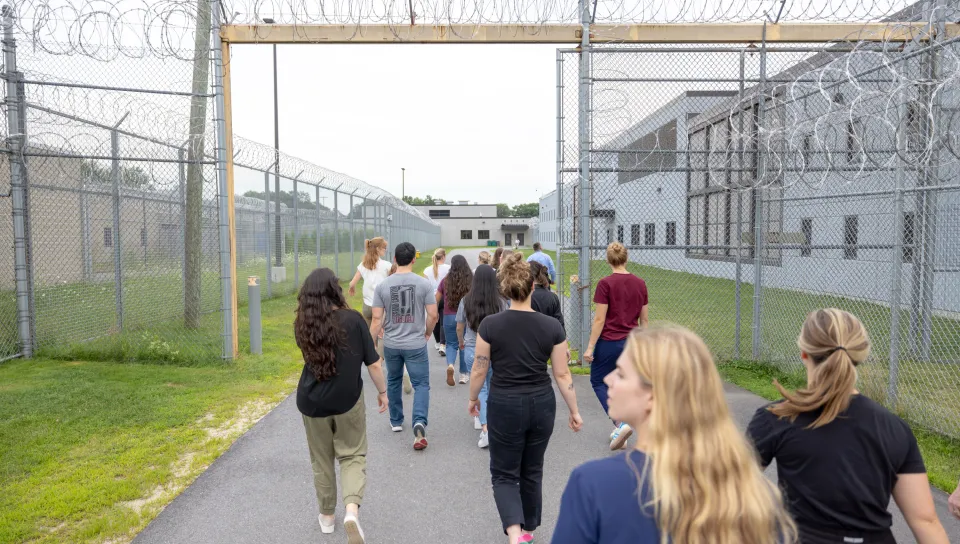
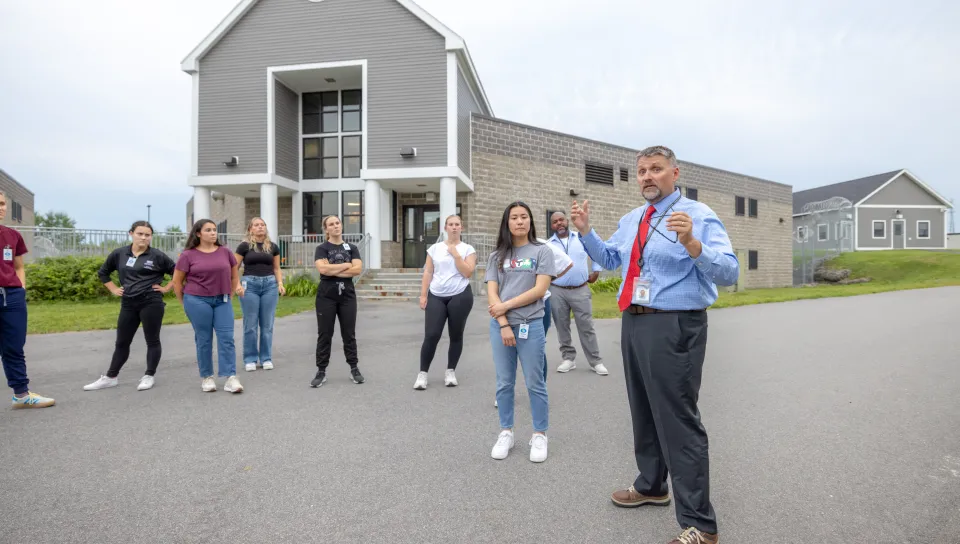

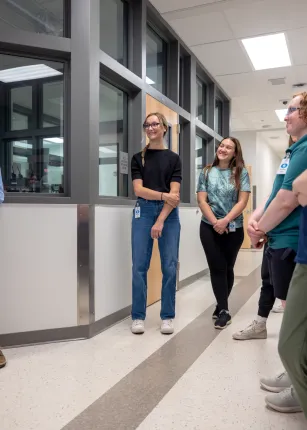
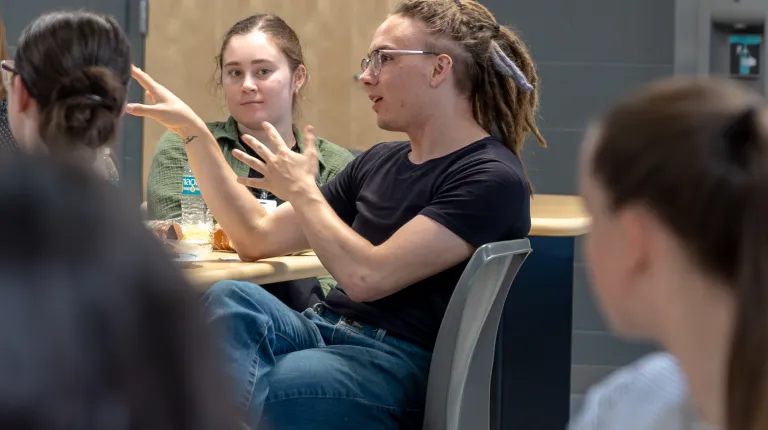
None of the 30 students who toured the facility on July 16 may ever work in a prison, Arbour noted, but building an understanding of the challenges faced by the residents of one is valuable for those studying to be physical therapists, physician assistants, and occupational therapists. When they treat people who have spent time in a correctional facility, Arbour said, they now will have a deeper understanding of how to help them.
“Language matters,” Arbour emphasized to the group at the outset of the tour. “We call the people staying in prisons ‘residents.’ They need to be treated like everyone else. When someone goes to a health care provider, they don't want to be stigmatized. If you remember one thing from here: Help to reduce stigma. We’re all human.”
Savannah Smith of Bucksport, Maine, one of six residents who shared their journey with the students in a panel discussion, spoke to that.
“There are residents here who are good people getting educated. If you want to take the next step, if you really want to better your life here, you can do it. I want my children to be able to be proud of me, to look up to me,” Smith said, as her voice caught.
Since Smith came to the correctional center on a drug charge in 2019, she earned an associate's degree from Beal College as a medical assistant with a certification in substance abuse recovery. Next, she intends to pursue a bachelor’s degree. She’s furthering her education online while also working as a recovery coach to help other women residents fighting drug addiction.
“I want them to know they’re not alone. That’s one of the big things in addiction,” Smith told the students. “They feel alone, like nobody cares about them. I appreciate you guys writing the letters because getting a letter from somebody who doesn’t even know you — you have no idea. You’re just given that love.”
Under Mason’s direction, students in UNE’s Service Learning Program also make harm-reduction kits in collaboration with the Department of Corrections for when residents reenter their community, after they leave the correctional center. Kits include personal hygiene products, drugs that can help prevent an overdose, such as Narcan, and hand-written notes with messages of support and friendship, such as: “you are an important member of our community” and “I see you, I support you, and your success matters to me.”
Jason Bishop of Lewiston, Maine, told the UNE students that being a recovery coach in the correctional center has helped him by allowing him to give back. Later, Bishop said the chance to share his story with the students also helped him.
“It's good to show people from the public, to help humanize us. We have families, hopes, dreams, and goals,” Bishop said. “I have a teenage son, a trans son. They are my support. I just want my child to be proud of me. I was locked up for drug trafficking. I don't want that to be the end of my story.”
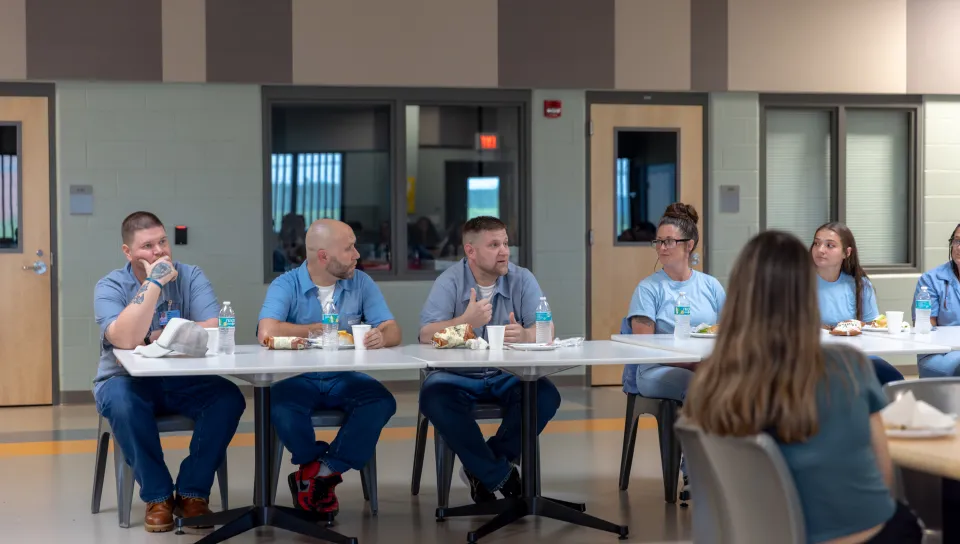
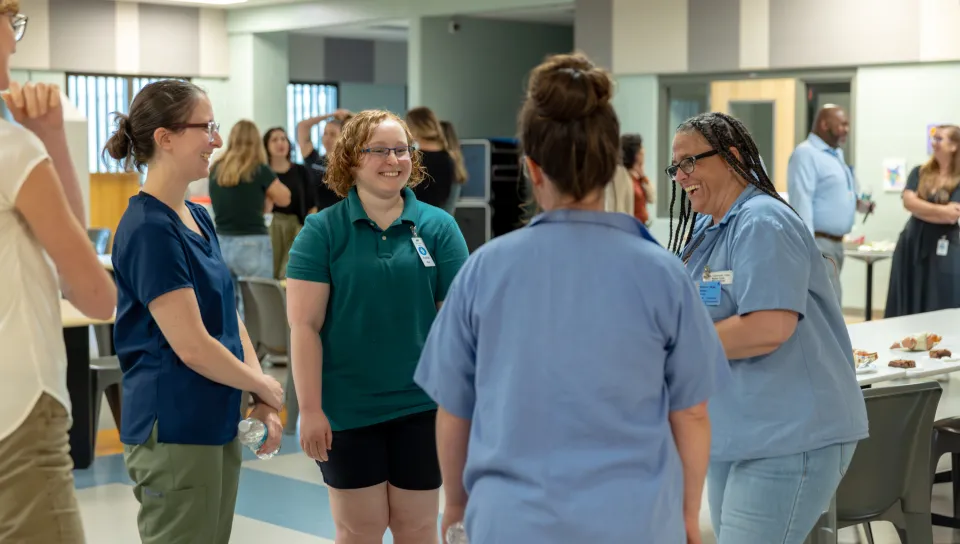
Vincente DeBack (D.P.T., ’26) was stunned by Bishop’s frank admissions — and said the correctional center was nothing like what’s shown in movies.
“They are given the support to better their lives, their relationships, and their futures,” DeBack said. “That support is peer-driven, not authority-ruled. It has definitely influenced how I want to practice as a healthcare provider. No matter who walks through my door, they deserve a listening ear.”
The tour of the facility that housed 270 men and 90 women took students past a massive vegetable garden, through the center’s kitchen, medical center, and the vast recreational center that includes a barber shop, gym, pickleball courts, and a music room.
UNE students also got a look inside the residents’ sleeping quarters, including the Maine Women’s Center and one of two “earned living units,” where those who demonstrate exemplary behavior are allowed more freedom. At the higher-security building, where residents are assigned to cells, Arbour explained that the medical office there was not fully functional due to staffing shortages.
Mason turned to nod at her students, as if to flag an opportunity that existed here. But finding ways to bring health care to this community already had occurred to at least a few students.
“I asked if they’d be interested in pro-bono services after I graduate, especially when I heard that there's no PT here,” said Maggie Chang (D.P.T., ’26). “The residents still have injuries from cooking, gardening, and playing sports. You don't realize what life is like here when you’re on the outside. But when you hear their stories, they’re still human; they still deserve care and respect.”